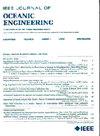Probability-Based Complex-Valued Fast Iterative Shrinkage-Thresholding Algorithm for Deconvolution Beamforming
IF 3.8
2区 工程技术
Q1 ENGINEERING, CIVIL
引用次数: 0
Abstract
Conventional beamforming is widely used in sonars and radars owing to its robustness and low complexity; however, it suffers from low beam resolution and high-intensity sidelobes. Various imaging deblurring methods have been used in deconvolution beamforming to improve the beam resolution. A considerable limitation of these intensity-based methods is that the real-valued model mismatches the signals in practice and ignores the coherent information of the received signals. This study proposes a probability-based complex-valued fast iterative shrinkage-thresholding algorithm (CFISTA) to extend deconvolution beamforming to the complex domain. In this novel algorithm, the complex gradient descent and complex probability mapping are combined. Fast Fourier transform acceleration and clustering prior constraints are used on the targets to improve the efficiency and accuracy of the model. Simulation results of planar arrays show that the proposed method has superior beam resolution, sidelobe suppression, running time, and noise immunity compared with those of intensity-based methods.用于解卷积波束成形的基于概率的复值快速迭代收缩阈值算法
传统波束成形因其稳健性和低复杂性而被广泛应用于声纳和雷达中,但它也存在波束分辨率低和高强度侧扰的问题。解卷积波束成形中使用了各种成像去模糊方法来提高波束分辨率。这些基于强度的方法有一个很大的局限性,即实值模型与实际信号不匹配,忽略了接收信号的相干信息。本研究提出了一种基于概率的复值快速迭代收缩阈值算法(CFISTA),以将解卷积波束成形扩展到复值域。在这种新算法中,复梯度下降和复概率映射相结合。在目标上使用了快速傅里叶变换加速和聚类先验约束,以提高模型的效率和精度。平面阵列的仿真结果表明,与基于强度的方法相比,所提出的方法在波束分辨率、边距抑制、运行时间和抗噪能力方面都更胜一筹。
本文章由计算机程序翻译,如有差异,请以英文原文为准。
求助全文
约1分钟内获得全文
求助全文
来源期刊

IEEE Journal of Oceanic Engineering
工程技术-工程:大洋
CiteScore
9.60
自引率
12.20%
发文量
86
审稿时长
12 months
期刊介绍:
The IEEE Journal of Oceanic Engineering (ISSN 0364-9059) is the online-only quarterly publication of the IEEE Oceanic Engineering Society (IEEE OES). The scope of the Journal is the field of interest of the IEEE OES, which encompasses all aspects of science, engineering, and technology that address research, development, and operations pertaining to all bodies of water. This includes the creation of new capabilities and technologies from concept design through prototypes, testing, and operational systems to sense, explore, understand, develop, use, and responsibly manage natural resources.
 求助内容:
求助内容: 应助结果提醒方式:
应助结果提醒方式:


